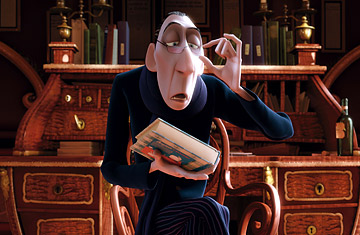
Food critic Anton Ego in the Disney film Ratatouille
Correction Appended: March 17, 2010
When news broke last week that Raymond Sokolov, the longtime restaurant critic of the Wall Street Journal, was out, the average foodie probably didn't look up from his plate. Some middle-aged guy isn't writing reviews for a newspaper whom few even knew had a restaurant critic. So what?
Real foodies should be concerned that critics like Sokolov are an endangered species. Their habitat — big-ticket, fine-dining restaurants — shrinks every year, encroached upon by gourmet hamburger joints, taco stands and various other chic, no-frills eateries. Their food supply — the expense accounts of large newspapers and magazines — has withered. And their most invaluable asset — their towering authority — has been leached away by blogs and review websites, leaving them without a place in the new ecosystem. All of which is too bad, because critics like Sokolov ought to be at the very center of it.
When you like a critic, you trust his judgment not because he has a doctorate in food letters, although such things do apparently exist. He's proved himself over a long period. You know what he likes or dislikes. You get him. Maybe you don't always agree; but when you're looking at getting a babysitter and maybe dropping three bills on dinner, you need to minimize risk. For that, the user reviews on Citysearch or Yelp are beyond useless — they're faceless and contradictory — and the same goes for blogs. (Blogs at least sometimes take pictures.) So there, in that whirlwind of trends and fad ingredients and hype and backlash, are a few immense ancient trees, with sturdy roots and massive trunks to hew to.
Sokolov is a rarity even among big-paper critics: though he was only officially the Journal's restaurant critic since the fall of 2005, he has written about food for decades, and brought a wealth of cumulative knowledge to the baffling array of weird foods, concepts and trends that a 21st century eater has to face. Critics, even at potent establishments like the New York Times, tend to be younger, and are often former reporters or freelancers who don't have much of a food background. Even those like Jonathan Gold at LA Weekly or Tom Sietsema of the Washington Post, who came to the job with culinary experience, rarely had the kind of vast, transatlantic eating chops as Sokolov, not to mention 20 or 30 years of serious pro eating all over America. The list of writers who bring that kind of perspective can be counted on one maimed hand. There's Alan Richman at GQ, Jeffrey Steingarten at Vogue, Corby Kummer at the Atlantic and Ruth Reichl at Gourmet — that is, before Condé Nast shut down Gourmet last year.
To some degree, the decline of the restaurant critic was inevitable, brought about by the end of fat-cat budgets and the multiplicity of bloggers and opinion sites on the Web. But it's also true that no critic of any status can be anonymous anymore. Frank Bruni of the Times guarded his identity like a relocated mob witness, but every chef in town knew what he looked like from Day One. Another factor, less mentioned but probably more relevant, is simple fatigue. It's hard to get worked up over a piece of chicken after you've been in the game for 20 years. The girl with a blog and a digital camera for whom every cutlet is a new adventure spreads excitement, while her jaded rival serves up mostly ennui.
Of course, they don't see it that way. I've taken my share of barbs from Richman, who considers me something of a boob, albeit a likable one. But I'm not offended, because he pretty much takes it for granted that the current crop of food writers, at least the online ones, are a cacophony of dazzled novices, opining confidently in an intellectual vacuum. And he's not wrong. There are no more authority figures anymore. Sokolov, for his part, regrets the passing of "thorough, objective, anonymous reviewing." That criticism, he tells TIME, is "increasingly relevant as the scale of glam cheffery [has] expanded along with the blogosphere."
Sokolov, like many of the top critics from his generation, suffers from "back in the day"-itis. "Nobody [is] ever going to be as influential as the Times critics of the '60s and '70s," he says. (New York's Gael Greene can be counted upon to say the same thing whenever asked.) But the kind of influence the Times had in the '70s was hardly worth having. A few thousand urban mandarins depended on its reviews, and proceeded to agree or disagree. Restaurants didn't matter in the culture the way they do now. Ordinary Americans west of the Hudson and north of the Harlem didn't know, or care, what was going on in the culinary avant-garde. They were still stuck eating at Lum's. Now, thanks to all the things the ancient regime most loathes — the Food Network, Top Chef, Eater and other blogs, Tony Bourdain, Momofuku mania, Rachael Ray, celebrity-chef restaurants — America has become as turned on by food as any Ford-era gourmand. But they lack the one thing that the old guard has in spades: perspective.
Josh Ozersky is a James Beard Award–winning food writer and the author of The Hamburger: A History. You can listen to his weekly show on the Heritage Radio Network and read his column on home cooking on Rachael Ray's website. He is currently at work on a biography of Colonel Sanders.
The original version of this article misstated that Raymond Sokolov had been the restaurant critic of the Wall Street Journal for 25 years. Though Sokolov did write often about food for the paper, he was only officially the regular restaurant critic since the fall of 2005.
